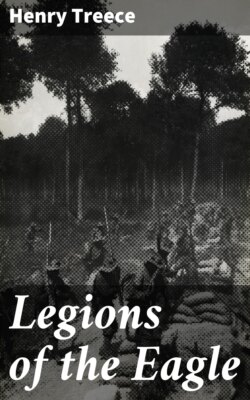Читать книгу Legions of the Eagle - Henry Treece - Страница 3
На сайте Литреса книга снята с продажи.
ABOUT THIS STORY
ОглавлениеTable of Contents
This is the story of a boy who lived at the time of the first real Roman invasion of Britain. Julius Caesar had visited this island twice before, but largely as a means of obtaining information about it. However, in A.D. 43 the Emperor Claudius sent his general, Aulus Plautius, to do the job properly!
Now, the British peoples with whom Aulus Plautius had the most trouble were the Belgae, a warlike group of tribes who had only recently come from Gaul themselves, and so already knew something of Roman methods. The boy-hero of this tale, Gwydion, is one of these Belgae. His father is a farmer near Colchester, though when he is needed, he forms one of the warband of the young Belgic king, Caratacus.
The Romans broke the strength of these Belgae near Colchester, using those strange animals, the elephants, as a means of terrifying the native charioteers. After this, Caratacus fled to what is now South Wales, and soon became ruler over the people there. He continued to give the Romans a great deal of trouble until, with the help of a British queen, Cartismandua, they captured him and sent him to Rome. There his proud bearing was such that the Emperor Claudius pardoned him and even allowed him to live out his days peacefully as a pensioner.
It should be said that many peoples had been coming to Britain since the dawn of history, and that they were each rather different in race and outlook. Some were small and dark, some sturdy and brown-haired, some red-haired, and some tall and fair-haired. They were as different from each other as a present-day Swede might be from an Arab. Yet we know them all by the name of Celts! The fact is that we class them according to the language which we think they spoke, Celtic; and this is represented in modern times by Irish Gaelic, Scots Gaelic and Welsh. In Gwydion's time this language would be spoken over the greater part of Europe, and even understood as far as the borders of the country we now call Greece.
This is a story of battle and treachery, as might be expected where so many peoples were living together, each with its own kings and heroes and beliefs. But at the end you will see that the point the tale tries to make is that it doesn't matter what colour your hair is, or what language you speak. The important thing is—what sort of person are you?
If you feel that you need to, turn to pages 171 and 172. Some words that might be new to you are explained there. Though actually they don't matter, as long as you enjoy the story!
For Joan Proctor who suggested that I should write this book
